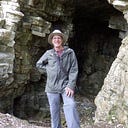Contemplation — A Lost Art?
I published the following essay at www.bestthinking.com in 2012. It seems not to have lost any of its relevance now.
— — — — — — — — — — — — — — — — — —
It’s been brought home to me, again and again recently. Somehow ‘thinking’ has acquired a bad reputation. People dislike thinking. ‘It makes my head hurt — more than my pay scale warrants’ someone said to me recently, when I asked for his considered opinion about how to resolve a complex and delicate issue. And it isn’t just doing thinking that people have developed an aversion to. Thinking itself is increasingly thought of as ‘not nice’ — a cold, calculating activity that precludes human warmth: an unkind kind of ‘machine code’. Rationality as the enemy of Emotion. By the same token, emotion has been alienated by rationalists as at best, subjective sentimental nonsense, at worst a recipe for outrage.
This has puzzled me. I think a lot. People tell me I think too much. Apparently it makes me a ‘party pooper’. And talking about parties, woe betide any politician who appears ‘too cerebral’. Much better to talk popular nonsense that appeals to peoples’ emotional prejudice by calling them to take sides against one another, than find a truly democratic way of taking all legitimate views into consideration.
But I don’t think about thinking as calculating or cold.
Meanwhile the symptoms of NOT THINKING are all too evident to me in the frantic rush, feverish competition, needless violence and rampant environmental non-sustainability of modern life.
What’s wrong with thinking? Or, rather, what’s gone wrong with thinking?
A moment’s contemplation reveals to me that having followed a long and winding road from Ancient Greece, so called ‘western thinking’ finally and perversely turned up a blind alley into analytical narrow-mindedness during the so-called ‘Enlightenment’ and ‘Scientific Revolution’. Thinking thence became fully attenuated into ‘objective rationality’, a Cartesian device designed to banish our natural-born sensation, intuition and feeling behind a wall of definitive logic. Nature became something to interrogate scientifically within prescribed conditions in order to test whether or not she conformed with our suppositions (hypotheses) about her and so yield up her secrets (‘laws’) and come under our control.
But I don’t feel that way about thinking — and in fact expressed my feelings about that kind of slashed down thinking in 1973, when depressed after a year’s scientific PhD research, in the following painting.
I showed this painting once at a scientific conference discussing the theme, ‘What is an Organism’. A fellow speaker, keen on neo-Darwinism, selfish gene theory and artificial intelligence cheerfully identified himself with the alienated figures on the right-hand side of the painting. He drily defined an organism as ‘an information processor’. I wetly described an organism as ‘an embodied water flow’, and illustrated this with my painting below, celebrating the fluid emergence of ‘biodiversity’ beyond of the confines of a rigid ‘box of genetic determinism’. Hmmm.
Now, to my mind, this latter painting is the product of a kind of ‘uncut thinking’, which does not exclude my human intuition, sensitivity or feeling, but actively and deliberately includes them. It works with natural space as a receptive continuum or ‘blank canvas’ and natural boundaries as energetic interfacings or ‘fluidized pigment’.
It is full of thoughtful awareness of natural form as flow-form, a tangible energetic configuration of intangible receptive space.
I have called that kind of thoughtful awareness ‘natural inclusionality’. I have written far too much about it.
It arises neither from cut-down rationality nor from unthinking emotion, but from a lively, joyful, considerate kind of thought, which can’t be rushed but can come ‘in a rush’ when we release our selves from the entrapment of the ‘Enlightenment’ and recover what may have become a ‘lost art’ — The Art and Science of Contemplation.
Perhaps if we re-educated our selves into Contemplation as a far deeper form of ‘thinking’ than we have come to think of as ‘thinking’, Thinking Itself could recover its good name — an activity to be enjoyed, not one that ‘makes our brains hurt and our hearts sink’.
— — — — — — — — — — — — — — — -
For further exploration of my thinking, please view other Medium essays and/or visit my personal website at http://www.spanglefish.com/exploringnaturalinclusion
